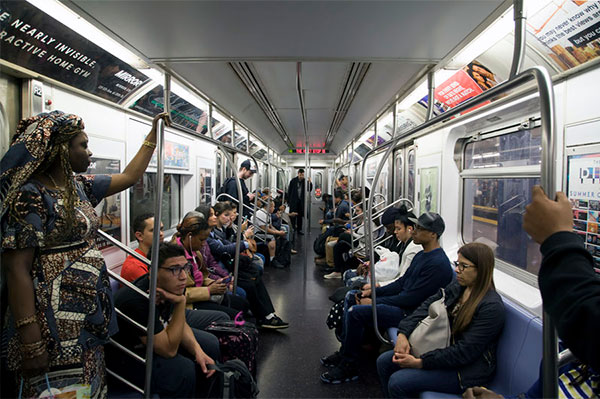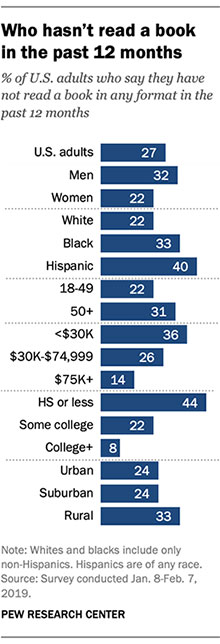
When I grew up in New York City I rode the Subway almost every day. I recall how many people were reading as they rode along: newspapers (in different languages) books, magazines, Bibles, pamphlets. I vividly remember one day when it seemed that half the passengers in the car I was on were reading The Godfather. It was a city of readers. The subways were rolling reading rooms.
A couple of months ago I was in New York for a day but managed (which I love to do) to ride the subway. To get where I was going required three trains. During my whole trip I saw only ONE person reading a book. NO newspaper readers. To be sure any number of cell phones were in hands so I have no idea what—if anything—they were reading.
 Pew Research Center: “The share of Americans who report not reading any books in the past 12 months [1919) is higher today than it was nearly a decade ago—though there has been some fluctuation over this time period. Today, 27% of adults say they have not read any books in the past year, up from 19% in 2011, but identical to the share who said this in 2015.”
Pew Research Center: “The share of Americans who report not reading any books in the past 12 months [1919) is higher today than it was nearly a decade ago—though there has been some fluctuation over this time period. Today, 27% of adults say they have not read any books in the past year, up from 19% in 2011, but identical to the share who said this in 2015.”
What is missing from this data is what young people (under the age of 18) are reading. Because reading books (not cell phones) is still required in schools I think it is fair to suggest that young people are reading more than any other group in the country. Repeat: young people are reading more than any other group in the country. That reading may not be freely chosen, but it is reading.
This has enormous implications for the world of children’s literature. It has particular meaning for teachers and librarians. If they can bring about a passion (and habit) for reading among youth, it can, over time, radically shift the data cited above.
At the same time in my travels I hear more and more that school libraries and librarians are being marginalized or eliminated.
In the Bible, Daniel 5, there is the story of the writing on the wall, which is interpreted as foretelling the fall of the Babylonian Empire. It was a warning.
If there is writing on our society’s walls, and we can’t or won’t read it, what then?
1 thought on “Who is reading?”
My friends oft read stories online, which can be as long as novels.